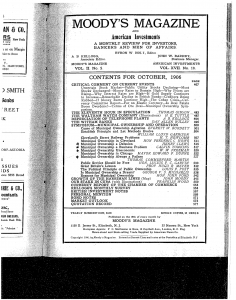Municipal nets, municipal electric power, and learning from history
The debate over whether municipalities should be allowed to provide Internet access has been heating up. Twenty states ban it. Tom Wheeler, the chair of the FCC, has said he wants to “preempt” those laws. Congress is maneuvering to extend the ban nationwide.
Jim Baller, who has been writing about the laws, policies, and economics of network deployment for decades, has found an eerie resonance of this contemporary debate. Here’s a scan of the table of contents of a 1906 (yes, 1906) issue of Moody’s that features a symposium on “Municipal Ownership and Operation.”
The Moody’s articles are obviously not talking about the Internet. They’re talking about the electric grid.
In a 1994 (yes, 1994) article published just as the Clinton administration (yes, Clinton) was developing principles for the deployment of the “information superhighway,” Jim wrote that if we want the far-reaching benefits foreseen by the National Telecommunications and Information Administration (and they were amazingly prescient (but why can’t I find the report online??)), then we ought to learn four things from the deployment of the electric grid in the 1880s and 1890s:
First, the history of the electric power industry teaches that one cannot expect private profit-maximizing firms to provide “universal service” or anything like it in the early years (or decades) of their operations, when the allure of the most profitable markets is most compelling.
…
Second, the history of the electric power industry teaches that opening the doors to anyone willing to provide critical public services can be counterproductive and that it is essential to watch carefully the growth of private firms that enter the field. If such growth is left unchecked, the firms may become so large and complex that government institutions can no longer control or even understand them. Until government eventually catches up, the public may suffer incalculable injury.
…
Third, the history of the electric power industry teaches that monopolists will use all means available to influence the opinions of lawmakers and the public in their favor and will sometimes have frightening success
…
Fourth, and most important, the history of the electric power industry teaches that the presence or threat of competition from the public sector is one of the best and surest ways to secure quality service and reasonable prices from private enterprises involved in the delivery of critical public services.
Learn from history? Repeat it? Or intervene as citizens to get the history we want? I’ll take door number 3, please.
Categories: berkman, net neutrality, policy dw










